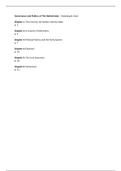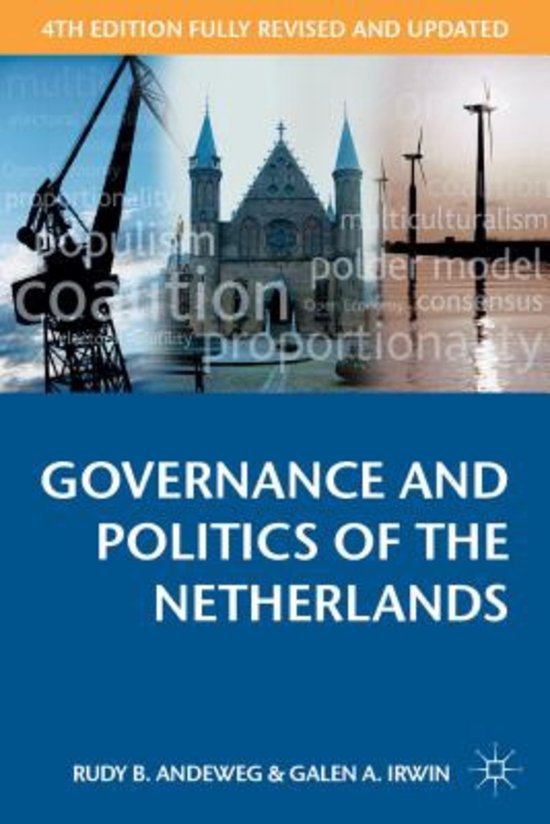Governance and Politics of The Netherlands – Andeweg & Irwin
Chapter 1: The Country, the Nation and the State
p. 2
Chapter 2: A Country of Minorities
p. 4
Chapter 3: Political Parties and the Party System
p. 7
Chapter 4: Elections
p. 14
Chapter 5: The Core Executive
p. 18
Chapter 6: Parliament
p. 21
,Chapter 1: The Country, the Nation and the State
Three Boundaries
In the area of the Rhine river delta, three boundaries – linguistic, religious and political – divide
the peoples of the lowlands. The fact that these three boundaries do not coincide influences
the politics of both the Netherlands and its southern neighbor Belgium today.
The Political Boundary
In January 1579, the rebel northern provinces met at Utrecht to form ‘a closer union’ in which
they were to retain their sovereignty, but would act as a single body in foreign policy.
Catholics feared William I’s Protestantism and his support of state over church schools. They
also opposed him in his attempts to centralize authority at the expense of local interests.
Liberals, on the other hand supported him in his centralizing and anti-clerical tendencies, but
opposed his restrictions on the freedom of press and his promotion of Dutch interests.
Calvinism and Tolerance
One reason Calvinist theology won out was that, in contrast to Catholicism and Lutheranism,
Calvin argued that it was justifiable to revolt against an ungodly government. Thus, it gave
justification to the resentment against the Spanish king (Philip). The Calvinists provided the
backbone for the revolution that was to establish the independence of the Netherlands.
The Union of Utrecht can be taken as the founding of the modern Netherlands, and two years
later the country became de facto independent. Sovereignty was offered to the king of France
and the queen of England, but both refused, and the country became the first modern
republic. The country was a union of sovereign provinces, and according to the treaty,
decisions were to be taken unanimously. This proved not always to be the case, but the
consultations attempting to reach decisions acceptable to all are said to be the foundation of
what centuries later world be known as Consensus or Consociational Democracy.
The Dutch Reformed Church was perhaps de facto, but never de jure, a state church, and other
religious groups were tolerated. Though adherents of other faiths did not receive full benefits
of citizenship, they were allowed to practice their religion, at least if it was not done so too
openly.
Daalder (1985) has argued that the war produced greater support for parliamentary
democracy. Experiences with the occupation les to the rejection of authoritarian solutions
that has been proposed in the 1930s (and even during the war) as a reaction to the economic
difficulties of the Great Depression. It brought a greater appreciation of domestic institutions
and led to the acceptance of a larger role for the state. The latter was important in producing
conditions for the establishment of the welfare state. And it produced greater acceptance of
the various groups within Dutch society, especially Catholics and socialists.
The country became known for its policies towards drugs, prostitution, abortion, and
euthanasia. Kennedy (1995) argues that one reasons these changes were tolerated, and even
stimulated, by the elite, was the desire to reshape the society that had emerged from the war.
A Nation of Joiners
Subcultural organizations have weakened in general, but the impact has been most noticeable
in the religious subcultures. From being one of the most religious societies in Europe, by the
year 2000 the Netherlands had become the society within Europe with the lowest percentage
of religious adherents.
2
, Dekker (2000) has argued that focusing only on changes in membership political parties,
religious groups and trade unions is no longer sufficient to understand how Dutch citizens
participate in civic life. He has grouped civic activities into five categories to help in
understanding these changes: informal opinion formation, party participation, mobilization,
activism, and protest potential. Between 1972 and 1998 two categories show a decline. ‘Party
participation’ dropped from 25/30% to 18%. ‘Mobilization’ dropped from 42% to 22%. One
category shows no trend: ‘informal opinion formation’. Two types of categories have become
more popular: ‘Activism’ and ‘protest potential’.
Constitutional Development
The international events that helped establish the borders of the Netherlands and influenced
its national identity and political culture have also had a profound impact on the Dutch
Constitution. Little is left to remind the current observer of the Republic of the Seven
Provinces, but changes rarely resulted from purely domestic political institutions. The Republic
was a loose confederacy with little in the form of national political institutions.
The German occupation was insufficiently subtle as to rule trough institutions engineering and
left little to inherit. Perhaps a partial exception should be made for the institutionalization of
corporatist organizations that were to become so characteristic of Dutch socio-economic
policy-making. Before the war, corporatist reforms had been proposed, especially by
Catholics, but it was the Germans, not the Dutch, who made a start with the corporatist
reorganization of economic life. After the war these corporatist bodies were modified, but not
dismantled, and the German legacy became the starting-point for further efforts in this
direction by the Dutch government.
Chapter 2: A Country of Minorities
Three Threats to Stable Government
The peacefulness and stability of Dutch politics actually constitute a major achievement
because, historically, there have been three potential threats to stable government in the
Netherlands: the structural lack of an electoral majority party, the existence of at least two
distinct ideological dimensions in Dutch politics, and the segmentation of Dutch society.
à Minorities
the Netherlands is a country of minorities, which is without a doubt the single most important
characteristic of Dutch politics. Form the introduction of universal suffrage to the present, no
political party has ever succeeded in winning an electoral majority.
Though a numerical minority in the population at large, the Liberals dominated Dutch politics
for a long time during the 19th and early 20th centuries. The explanation is a simple one; the
Liberals’ electoral importance was enlarged artificially by restrictions of the franchise on the
basis of property and income criteria. As economic growth and legislation enfranchised more
and more citizens, the Liberals were gradually crowded out of political power.
The Liberals had to face political competition not only from religious minorities, but also from
the working-class movement and its political representatives. The Social Democrats entered
the political arena relatively late. The Netherlands was slow to industrialize. Before the start
of the 20th century there was hardly an economic basis for a working-class movement. The
appeal of the denominational parties crossed the newly developing class divide and left the
3





